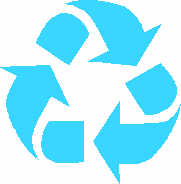Recycling
Buy Only What You Need
The best way to avoid the need for recycling or disposal of waste is to buy only what you need to get the job done. But sometimes this is impossible. Properly store any unused product in the original container for future use.
Consider donating excess products to charitable organizations. Check the community service pages in your phone book for local organizations willing to take donations. Extra paint, cleaning agents, building materials, and lawn and garden supplies can come in handy and help defray costs.
Reuse and Recycle
Reusing and recycling also helps curtail costs and pollution associated with mining and manufacturing new products.
For example, paint thinner and most solvents can be filtered and reused
Technological advances quickly make electronic equipment outdated although it is still usable.
Batteries, cell phones, computers, digital cameras, TV and electronic equipment can contain mercury, lead or cadmium, which can leach into landfills and possibly pollute our groundwater. Consider having your old electronics refurbished, donated or recycled.
Buy Earth-friendly Products
Choose natural based cleansers. Look for products containing citrus or nut extracts, or bicarbonate of soda (baking soda). Steer away from petroleum based products, phosphates or bleach.
Purchase pesticides and herbicides containing plant derivatives. Use organic fertilizers whenever possible. Try compost as an alternative to chemical soil additives.
Large amounts of oils do not readily break down in your septic system or at a municipal water treatment plant. Use latex or water based paint, varnishes and finishes. Water based products offer easy clean up and disposal of empty containers. Allow the container to air dry then discard.
Try cooking oil spray instead of butter or oil.
Avoid personal hygiene products containing oils or hydrogenated oil.
Other ways we can help avoid groundwater pollution.
Avoid chemical runoff from your yard and garden. Impervious surfaces such as driveways, pavements and walkways allow chemical and biological agents to enter our stormwater and eventually our groundwater. Don’t use products when rain is forecasted and mop up or sweep up spills as opposed to hosing off impervious surfaces. Substitute mulch or gravel where possible to allow water to seep into the ground and stop excessive runoff.
Use a commercial self-wash or automatic car wash. These facilities recycle water.
Clean up after your pets. Fecal matter can leach harmful bacteria into groundwater. Bag pet waste and dispose of properly.
Practice Proper Waste Disposal
Sometimes waste cannot be avoided, but how we dispose of it can make all the difference when it comes to cleaner groundwater. Never dump used motor oil, chemicals, bleach or solvents down the drain, into the yard or down a storm sewer.
If you do not know where in your community you can dispose of recyclable household waste, visit Earth 911which is a clearing house for recycling and disposal information nationwide. Just type in your zip code in the indicated box and hit enter.
Email us for additional information or questions about preventing groundwater pollution through reuse and recycling.
Sources: U.S. Department of Environmental Education, U.S. Environmental Protection Agency, Earth 911, Louisiana State University, Queensland Environmental Protection Agency.

